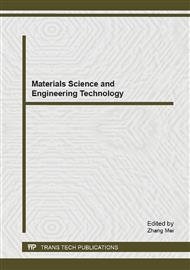p.1442
p.1446
p.1451
p.1456
p.1463
p.1468
p.1473
p.1479
p.1485
Back Analysis of Thermal Parameters of Mass Concrete and its Application Based on Micro-Genetic Algorithm
Abstract:
The value of thermal parameter is very crucial in simulating analysis on temperature control for mass concrete. The inverse analysis on some practical project is done by genetic algorithm and finite element method on the basis of observational data of temperature on the site. The temperature control simulation calculation is performed based on parameters obtained from inverse analysis on this project, so that the temperature distribution is consistent basically with the practical one. With improvement of micro-genetic algorithm, the genetic algorithm becomes globally-optimal by changing the optimal reserving and re-starting strategies. The results show this method is very practical in high precision of calculation in mass concrete parametric inversion.
Info:
Periodical:
Pages:
1463-1467
DOI:
Citation:
Online since:
June 2014
Authors:
Price:
Сopyright:
© 2014 Trans Tech Publications Ltd. All Rights Reserved
Share:
Citation:


